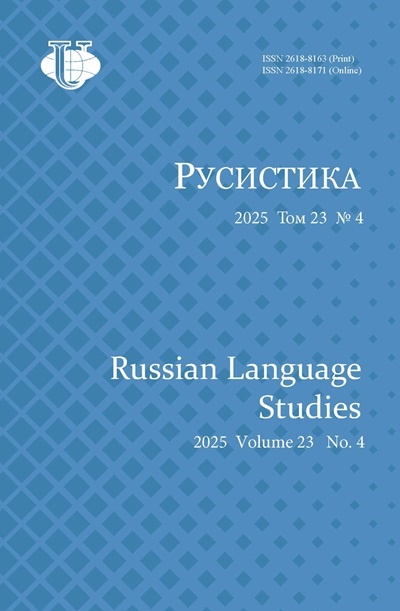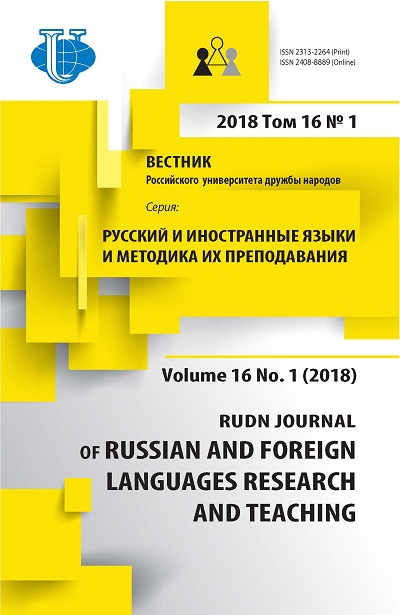О национально-культурном своеобразии русских филологических дисциплин
- Авторы: Аннушкин В.И.1
-
Учреждения:
- Государственный институт русского языка им. А.С. Пушкина
- Выпуск: Том 16, № 1 (2018)
- Страницы: 27-49
- Раздел: Актуальные проблемы изучения русского языка
- URL: https://journals.rudn.ru/russian-language-studies/article/view/18012
- DOI: https://doi.org/10.22363/2313-2264-2018-16-1-27-49
- ID: 18012
Цитировать
Полный текст
Аннотация
В статье анализируется национально-культурная специфика и терминология русских филологических дисциплин как своеобразная научная доктрина в разных областях знания, сложившаяся на основе классических теоретических руководств и современных исследований русских ученых-филологов. Русская филология восходит к античным теориям языка и речи, но развитие определенных дисциплин (грамматика, риторика, логика, поэтика) принимала своеобразный культурный облик в творчестве соответствующих авторов, и этот облик существенно отличался от западных руководств. Отношение к авторитетным западным руководствам могло быть трояким: копирование и осмысление, перевод-переработка и собственные дополнения, самостоятельное творчество в создании собственной терминологии и новых теорий языка.Рассмотрены четыре основополагающих термина, соответствующих четырем научным теориям, которые имеют наибольшее отношение к языковой практике и коммуникации современного общества. Это - собственно филология, словесность, риторика, культура речи. Именно в русской научной традиции сформировалось понимание общей филологии как науки, изучающей правила и законы создания, передачи, хранения, воспроизведения и функционирования словесных произведений. Филология связывает развитие культуры человечества, как с технологией создания речи, так и с совершенствованием смысло-содержательной стороны текста.Русской научной культуре принадлежит создание термина словесность, изначального понимаемого как дар слова, словесная способность, но оформившегося в фундаментальную теорию, изучающую совокупность всех словесных произведений национальной речевой культуры. Словесность понималась и как наука о слове в широком понимании, и как словесное творчество, искусство слова.В статье обобщаются сведения о национальной специфике русской риторики, которая, конечно, восходит к античным теориям, однако оформилась в оригинальную научную концепцию, предполагающую следующие смыслы: риторика - 1) фундаментальная наука о законах и правилах построения мысли и речи; 2) учение о целесообразной и эффективной, убедительной и уместной речи; 3) искусство речи (красноречие), основанное на таланте, развитии речевых способностей языковой личности человека.В русской филологической науке ХХ века оформилось такое оригинальное направление, как культура речи, первоначально понимавшееся как учение о литературной норме. Современная языковая ситуация требует более широкого толкования как термина культура (сохранение и творческое новаторство в речевой деятельности), так и термина речь, требующего и культуры мысли, и культуры слова, и культуры предложения, фразы, текста в целом, и культуры произношения.Автор статьи утверждает своеобразие русской национальной научной традиции и это - наилучшее свидетельство национального вклада в развитие мировой научной мысли. Перспективы исследования - в сопоставлении существующей русской национальной концепции филологических наук с иностранными традициями и современным состоянием научной мысли как на Западе, так и на Востоке, где развивается собственное видение и толкование рассмотренных вопросов.
Ключевые слова
Об авторах
Владимир Иванович Аннушкин
Государственный институт русского языка им. А.С. Пушкина
Автор, ответственный за переписку.
Email: vladannushkin@mail.ru
доктор филологических наук, профессор кафедры русской словесности и межкультурной коммуникации филологического факультета Государственного института русского языка им. А.С. Пушкина. Сфера научных интересов: филология, риторика, стилистика, культура речи, история русской филологии и риторики, преподавание русского языка как иностранного, текстология. Автор более 300 научных публикаций.
ул. Академика Волгина, 6, Москва, Россия, 117485Список литературы
- Аверинцев С.С. Филология / Слово-Логос. Словарь: собрание сочинений. Киев, 2006. С. 452- 462
- Аннушкин В.И. О творческом освоении М.В. Ломоносовым риторик петровского времени / «Знатным украшением Отечеству послуживший…» Творчество М.В. Ломоносова и культура России Нового времени: сборник. М.: Сибирская Благозвонница, 2014. С. 219-236
- Аннушкин В.И. Первая русская «Риторика» XVII века. Текст. Перевод. Исследование. М.: Добросвет, 1999. 362 с.
- Горшков А.И. Основы русской словесности (от слова к словесности). М., 1994
- Давыдов И.И. Чтения о словесности. М., 1837-1843. Курсы 1-4. Курс 1. Введение. Язык. Речь. Слог. М., 1837. 259 с.; Курс 2. Ораторская речь или витийство. Философские сочинения. Исторические сочинения. М., 1838. 327 с.; Курс 3. Поэзия лирическая. Поэзия Эпическая. М., 1839. 352 с.; Курс 4. Поэзия драматическая. М., 1843. 292 с
- Зеленецкий К.П. Курс русской словесности для учащихся. I. Общая риторика. II. Частная риторика. III. Пиитика. История русской литературы для учащихся. Одесса, 1849
- Кошанский Н.Ф. О преимуществах российского слова. Речь профессора российской и латинской словесности Н.Ф. Кошанского 19 октября 1811 года: учеб. пособие. М.: Форум, 2015. 100 с
- Кошанский Н.Ф. Риторика. М.: Русская панорама, 2013. 320 с
- Культура русской речи: энциклопедический словарь-справочник. Академия наук СССР Институт русского языка им. В.В. Виноградова. 2-е изд. М.: Флинта; Наука, 2007. 838 с.
- Лихачев Д.С. Об искусстве слова и филологии / О филологии. М., 1989. С. 204-207
- Ломоносов М.В. Краткое руководство к красноречию. ПСС. М.; Л., 1952. Т. YII. С. 89-378, 805-839
- Ломоносов М.В. Сочинения М.В. Ломоносова с объяснительными примечаниями академика М.И. Сухомлинова. Т. III. СПб.: Имп. академии наук, 1895
- Мерзляков А.Ф. Краткая риторика, или правила, относящиеся ко всем родам сочинений прозаических. В пользу благородных воспитанников Университетского пансиона. М., 1809. 2, 100 с.; 2-е изд., М., 1817. 4, 115 с.; 3-е изд., М., 1817. 108 с.; 4-е изд., М., 1828. 113 с
- Рождественский Ю.В. Общая филология. М.: Фонд «Новое тысячелетие», 1996. 326 с
- Рождественский Ю.В. Принципы современной риторики. М.: Флинта; Наука, 2003. 176 с
- Степанов Ю.С. Филология / Русский язык: Энциклопедия. М., 1997. С. 592-596
- Теория словесности. Курс гимназический (издание анонимное). Год 1-й. Риторика (авторы К.П. Зеленецкий, Н.Ф. Кошанский). Год 2-й. Теория прозы (автор К.П. Зеленецкий.) Год 3-й. Пиитика. Год 4-й. История русской словесности (автор К.П. Зеленецкий.). Издания 1-5 стереотипичные. СПб., 1851-1860
- Шанский Н.М. Лингвистический анализ художественного текста. М., 1990
Дополнительные файлы














